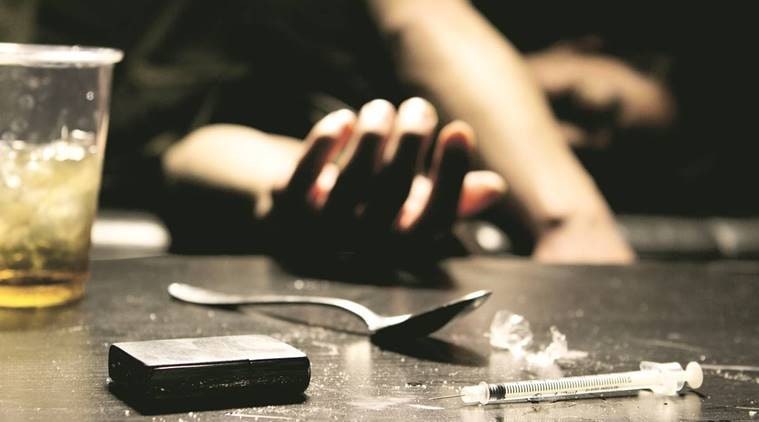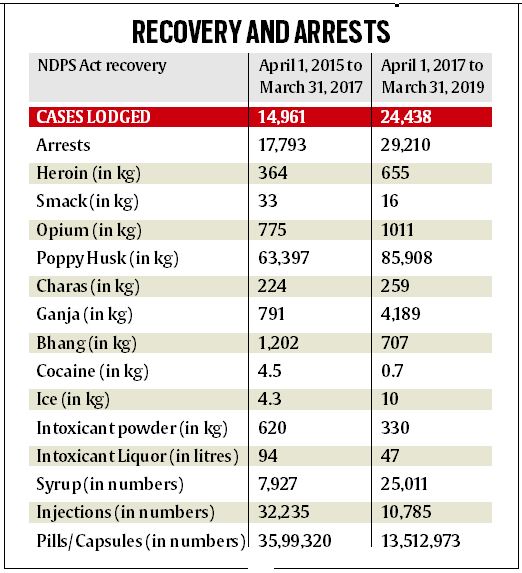
Three and a half. This is the daily average of the accused in drug cases involving intermediate and big (commercial) quantities getting bailed out in Punjab in the last six months. More than two years after Chief Minister Amarinder Singh vowed to break the backbone of drugs in four weeks, the statistics tell a contrasting story — one of drug menace continuing to haunt the state.
From the beginning of January to end of March this year, the official data accessed by The Indian Express reveals, the accused in as many as 296 intermediate and big quantity NDPS Act cases got bail. In the previous quarter ending December, the number was 336, taking total number of such cases in six months to 632.
As laid down in the law, there are two defined categories — the small and commercial, said an official of Punjab’s Anti-drug Special Task Force. Intermediate is the term used by us for any quantity which is more than small quantity and less than commercial quantity,” said the official. He added that up to 5 grams of heroin recovery is small quantity and more than 250 gram of heroin recovery is commercial. Anything between 5 grams to 250 grams of heroin recovery would be intermediate, the official said, adding that in 75 per cent to 80 per cent cases, the recoveries were “small quantity”.
The problem of drugs and its prevalence in worrying degree was a major talking point among people across the length and breadth of the state during the recently concluded Lok Sabha elections, despite politicians sparsely mentioning it in their poll pitch.
The issue is in spotlight again. CM Amarinder Singh and Union Cabinet minister and Akali leader Harsimrat Kaur Badal had a social media war recently where they took potshots at each other.. While Harsimrat accused Congress government led by Amarinder of having failed to curb the menace of drugs, Amarinder has been critical of Akali Dal for allowing to “flourish” the drugs in the state. Amarinder also pointed out that drug was an inter-state problem with national repercussions. He cited that legal poppy cultivation in some states and Pakistan pushing drugs from across the border made it an inter-state problem.

Political blame game apart, the menace continues to pose a challenge to incumbent government.
As per the data, Amritsar Rural tops with bails to maximum number of accused — 91 in quarter ending December last year and 86 in quarter ending March this year. Hoshiarpur is second with corresponding figures of 75 and 71.
Non-filing of challans in court in stipulated period of time has been one of the major reasons for accused getting bail.
Chief of the Anti-drug Special Task Force, Additional Director General of Police (ADGP) Gurpreet Kaur Deo, when contacted, said that the number of cases where accused were getting “default bails” due to non-filing of challan in stipulated period of time had “significantly come down”. She said challans used to get delayed as there was delay in getting results of the samples from the chemical laboratories. “After the coordination meetings, we have now ensured that there are very few default bails. We have made a 19-point proforma for monitoring the cases and there is quite a big decrease in cases under investigation and number of default bails,” said Deo.
Chief Minister Amarinder Singh on the other hand recently asked the State Advocate General Atul Nanda to form a panel of eminent legal luminaries, including retired judges, lawyers, legal experts and jurists, to impart practical training to the police personnel to enable them to effectively present their cases in the courts.
“Such hands-on training would equip the police officials handling legal cases against drug traffickers/peddlers/smugglers in an effective and result oriented manner. The expert panel so constituted would also train the police officials with the tools to overcome the technical legal infirmities and procedural loopholes being exploited by those arrested in drugs cases,” the CM was recently quoted as saying in an official press release.
The Chief Minister also directed the anti-drug Special Task Force chief to identify and take strict action against police officials found to be involved with drug traffickers, especially those posted in the border districts of the state.
Official records reveal that in quarter ending this March, 33 policemen were identified who either consumed drugs or promoted it. Jalandhar district leads, alone accounting for 25 such policemen, followed by Gurdaspur (6) and Amritsar (2). For the quarter ending December last year, there were 21 such policemen identified.
Increasingly under attack over the issue, Amarinder Singh government is leaving nothing to chance. On CM’s directions, reward policy has been formulated for government servants and informers in drugs cases. As per the policy, among those who would be considered for reward would be the officials who conduct successful investigation or ensure successful prosecution or achieve successful forfeiture of illegally acquired property of the accused in drugs cases.
Capt’s measures
Chief Minister Amarinder Singh is heading a newly formed consultative group on drugs in a bid to take the bull by the horns himself as his government is being criticised for having failed to tackle the problem of drugs. On his directions, anti-drug Special Task Force was constituted after he took over as CM in March 2017. ADGP rank Indian Police Service officer of Punjab cadre, Harpreet Singh Sidhu, was the first chief of the STF after he was prematurely brought back from central deputation. Sidhu had introduced initiatives like drug abuse prevention officer and buddy program as part of three pronged strategy of enforcement, de-addiction and prevention (EDP) — the approach that continues to define STF. DGP rank officer Mohammad Mustafa had replaced Sidhu after he was appointed as Special Principal Secretary in Chief Minister’s Office. Currently, the STF is headed by ADGP Gurpreet Kaur Deo.